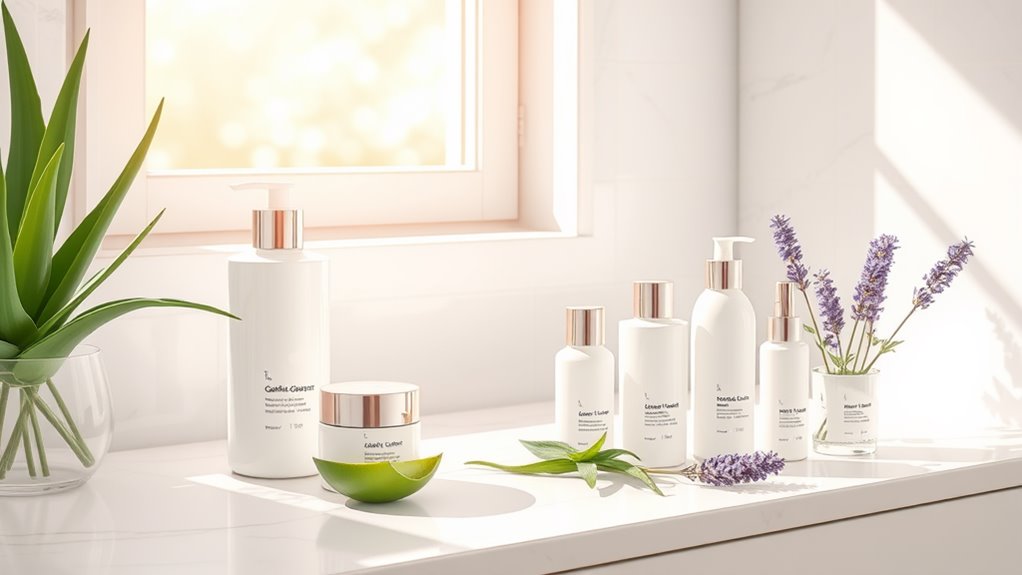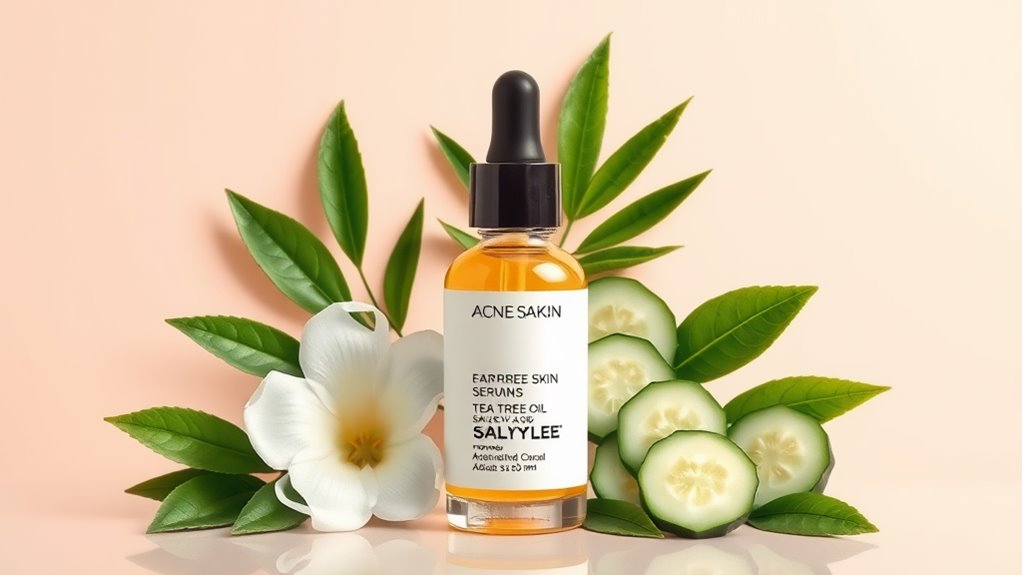Sensitive Skin- Here’s Your Go-To Skincare Routine
If you have sensitive skin, you know how challenging it can be to find a routine that works. Your skin may react to various products, leaving you frustrated and unsure of what to use. Fortunately, a gentle skincare routine can make a significant difference. By understanding your skin’s needs and choosing the right products, you can achieve a healthy glow. Let’s explore the essential steps you should take to care for your sensitive skin effectively.
Key Takeaways
- Use a gentle, fragrance-free cleanser with lukewarm water, cleansing twice daily to maintain moisture balance without irritation.
- Apply a rich moisturizer containing soothing ingredients like aloe vera and ceramides to reinforce the skin barrier.
- Avoid products with synthetic fragrances, alcohol, and harsh exfoliants that can trigger sensitivity or irritation.
- Stay hydrated by drinking plenty of water and using a hydrating serum with hyaluronic acid for optimal skin health.
- Incorporate sunscreen into your daily routine to protect sensitive skin from UV damage and environmental stressors.
Understanding Sensitive Skin
Understanding sensitive skin can feel overwhelming, but it’s essential to recognize its unique traits. You might notice your skin reacts to products that others use without issue. This heightened sensitivity can manifest as redness, irritation, or even a burning sensation.
It’s vital to identify triggers like harsh ingredients, environmental factors, or stress. When it comes to sensitive skin care, you’ll want to focus on gentle formulations that promote healing without causing further irritation.
Look for products labeled as hypoallergenic or fragrance-free, and always patch-test new items. Being mindful of your skin’s needs will empower you to build a tailored routine that soothes rather than exacerbates.
Mastering these fundamentals is the first step toward achieving healthy, resilient skin.
Essential Cleansing Techniques
When caring for sensitive skin, choosing the right cleansing techniques is essential, as improper methods can exacerbate irritation.
To master your cleansing routine, focus on these key practices:
-
Use lukewarm water: Hot water can strip natural oils, leading to dryness and irritation.
-
Opt for gentle cleansers****: Look for fragrance-free, sulfate-free formulas that won’t disrupt your skin barrier.
-
Limit cleansing frequency****: Cleanse your face twice daily to avoid over-cleansing, which can provoke sensitivity.
-
Pat dry with a soft towel: Avoid rubbing your skin; instead, gently pat it to minimize friction.
Choosing the Right Moisturizer
When it comes to choosing the right moisturizer, you need to pay attention to key ingredients that nourish your sensitive skin.
Make sure to avoid irritating additives that could worsen your condition, and think about the consistency and texture that feel best for you.
Finding the perfect balance will help keep your skin hydrated and healthy. Additionally, selecting products with anti-aging properties can enhance the overall appearance of your skin and contribute to its long-term health.
Key Ingredients to Look For
Choosing the right moisturizer for sensitive skin means paying close attention to specific ingredients that nourish and protect without causing irritation.
Focus on these key components to achieve ideal hydration:
-
Hyaluronic Acid: Attracts moisture and keeps your skin plump.
-
Ceramides: Strengthen the skin barrier, locking in hydration and preventing moisture loss.
-
Glycerin: A powerful humectant that draws water to the skin, ensuring lasting hydration.
-
Aloe Vera: Soothes and calms irritation while providing hydration.
Incorporating these ingredients can greatly elevate your skincare routine.
Always check labels and opt for products that prioritize these essentials to maintain your skin’s health and radiance.
With the right moisturizer, you can achieve a balance that feels comfortable and protective.
Avoiding Irritating Additives
While selecting a moisturizer for sensitive skin, it’s essential to steer clear of irritating additives that can exacerbate discomfort.
Look for products free from fragrances, alcohol, and harsh preservatives, as these can trigger reactions. Instead, opt for formulations with gentle, calming ingredients like aloe vera, chamomile, or hyaluronic acid.
Always check labels for potential allergens and avoid those with synthetic dyes or sulfates. Remember, a short ingredient list often indicates a purer product, which is crucial for your skin’s health.
Conduct patch tests before fully incorporating any new moisturizer into your routine, ensuring it won’t provoke irritation.
Choosing wisely can transform your skincare experience, helping you maintain a calm and balanced complexion.
Consistency and Texture Matters
Finding the right moisturizer for sensitive skin often hinges on its consistency and texture. You’ll want to choose a formulation that feels comfortable and soothing.
Consider these key factors:
-
Water-based vs. oil-based: Water-based options are lightweight and absorb quickly, while oil-based provide a rich, protective barrier.
-
Creamy vs. gel: Creamy moisturizers offer intense hydration, perfect for dry patches, while gels are invigorating and ideal for oily skin.
-
Thickness: Thicker creams may be beneficial in colder climates, while lighter lotions suit warmer conditions.
-
Absorption: Look for a product that absorbs easily without leaving a greasy residue.
Recommended Ingredients for Sensitive Skin
For anyone with sensitive skin, selecting the right ingredients can make all the difference in maintaining a healthy complexion.
Focus on soothing agents like aloe vera, chamomile, and calendula, as they calm irritation and reduce redness. Incorporate hyaluronic acid for hydration without clogging pores. Look for ceramides to restore your skin barrier and enhance moisture retention.
Antioxidants like vitamin E and C can protect your skin from environmental stressors while promoting healing. Additionally, consider using niacinamide, which helps improve skin texture and minimizes inflammation.
Always choose fragrance-free and hypoallergenic products to minimize the risk of adverse reactions. By carefully curating your skincare ingredients, you’ll empower your sensitive skin to thrive.
Products to Avoid
When it comes to caring for sensitive skin, avoiding certain products can be just as essential as choosing the right ones.
Using harsh or irritating ingredients can exacerbate your skin’s sensitivity, leading to discomfort and reactions. Here are some products you should steer clear of:
-
Fragrance: Synthetic fragrances can trigger irritation and allergies.
-
Alcohol: Alcohol-based products can strip your skin of moisture and disrupt its barrier.
-
Exfoliants: Harsh physical or strong chemical exfoliants can cause micro-tears and redness.
-
Sulfates: These cleansing agents can be overly stripping, leading to dryness and irritation.
The Importance of Sunscreen
Even with the right products, protecting your sensitive skin from sun damage is essential. Sunscreen acts as a barrier against harmful UV rays that can exacerbate irritation and lead to premature aging.
When choosing a sunscreen, opt for mineral-based formulas with zinc oxide or titanium dioxide, as these are less likely to irritate your skin. Look for broad-spectrum protection with an SPF of at least 30, and don’t skip reapplying every two hours, especially if you’re sweating or swimming.
Incorporating sunscreen into your daily routine, even on cloudy days, helps maintain your skin’s health and resilience. Remember, consistent sun protection is a cornerstone of any effective skincare regimen, particularly for sensitive skin.
Your future self will thank you!
Incorporating Exfoliation Safely
Exfoliation can be a beneficial part of your skincare routine, even for sensitive skin. To incorporate it safely, follow these essential guidelines:
-
Choose the Right Exfoliant: Opt for gentle chemical exfoliants like lactic or mandelic acid instead of harsh physical scrubs.
-
Start Slow: Begin with exfoliating once a week and gradually increase frequency based on your skin’s tolerance.
-
Patch Test: Always conduct a patch test before applying a new product to your entire face to avoid adverse reactions.
-
Moisturize After: Follow up with a soothing moisturizer to help maintain hydration and support your skin barrier.
Tips for Maintaining a Healthy Skin Barrier
To keep your skin barrier healthy, you need to focus on hydration and protection. Start by choosing a gentle, hydrating cleanser that won’t strip your skin of its natural oils.
Incorporate a moisturizer rich in ceramides and fatty acids to reinforce the barrier. Drink plenty of water daily, as internal hydration is just as essential.
Avoid harsh ingredients like alcohol and fragrances, which can irritate and compromise your skin’s integrity. When applying products, remember to layer them correctly—thicker creams can seal in moisture.
Finally, don’t skip sunscreen; UV rays can damage your barrier. By following these steps consistently, you’ll enhance your skin’s resilience and maintain that coveted healthy glow.
Your barrier’s strength is your ultimate defense.
Frequently Asked Questions
Can Sensitive Skin Be Treated With Home Remedies?
Absolutely, you can treat sensitive skin with home remedies! You’ll find soothing ingredients like aloe vera, chamomile, and oatmeal effective. Just remember to patch test first, and always listen to your skin’s unique needs.
How Often Should I Change My Skincare Products?
You should change your skincare products every three to six months or when your skin shows signs of irritation or doesn’t improve. Regularly assess your skin’s needs and adjust your routine accordingly for ideal results.
Is Sensitive Skin Hereditary or Environmental?
Sensitive skin can be both hereditary and environmental. If your family has a history of skin issues, you might inherit those traits. However, lifestyle factors like pollution or products can also trigger sensitivity in your skin.
Can Diet Affect Sensitive Skin Conditions?
Yes, your diet can greatly affect sensitive skin conditions. Consuming anti-inflammatory foods, staying hydrated, and avoiding allergens help maintain skin health. Pay attention to how different foods impact your skin, and adjust accordingly.
When Should I See a Dermatologist for Sensitive Skin?
You should see a dermatologist if your sensitive skin shows persistent irritation, redness, or discomfort despite following a routine, if reactions worsen, or if over-the-counter products aren’t effective. Don’t hesitate to seek professional advice!
Conclusion
Taking care of sensitive skin doesn’t have to be overwhelming. By following a gentle routine that includes a mild cleanser, a nourishing moisturizer, and effective sun protection, you can keep your skin calm and healthy. Remember to patch-test new products and stay hydrated for the best results. With these simple steps, you’ll maintain a resilient skin barrier and enjoy a more comfortable complexion. Embrace your skincare journey and watch your sensitive skin thrive!





